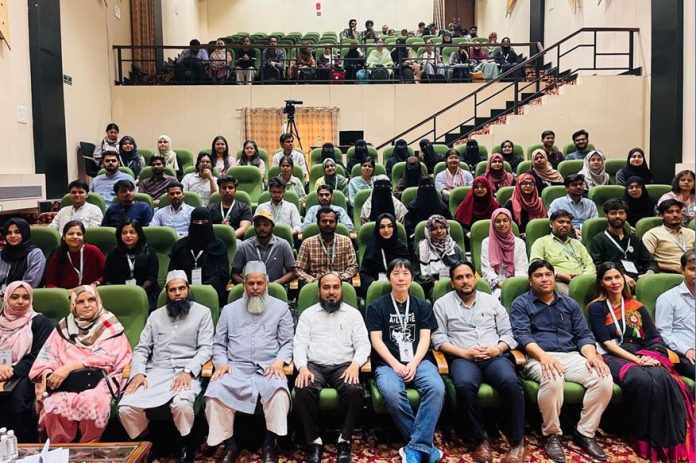Aligarh: The Department of Industrial Chemistry, Aligarh Muslim University (AMU), concluded a significant five-day Global Initiative of Academic Networks (GIAN) course titled “Fascinating Features of Nano-dimensional Smart Materials.” The programme brought together distinguished scientists and academicians from around the world to delve into the evolving practical applications of nanomaterials, with a special emphasis on their interfacial properties.
The highlight of the course was the presence of Prof. Haitao Liu from the University of Pittsburgh, USA, who delivered a series of intellectually stimulating lectures on 2D nanomaterials, emphasising their synthesis, interfacial characteristics, applications, and characterisation techniques. Prof. Liu elaborated on how DNA nanoparticles and 2D materials are revolutionising molecular science. He also conducted a hands-on training session and presented a detailed video demonstration on synthesising nanoparticles using DNA as structural scaffolds, greatly enriching the participants’ learning experience. In his concluding remarks, Prof. Liu praised the GIAN initiative as a “powerful model for knowledge sharing and research capacity building” and lauded AMU’s Department of Industrial Chemistry for its well-organised and impactful programme.
Prof. Sameer Sapra from the Indian Institute of Technology (IIT) Delhi delivered an impactful lecture on semiconducting nanomaterials for electrochemical and optoelectronic applications. His insights into novel material design for catalysis and energy storage opened new directions for future research in functional materials.
Dr. Mohammad Zain Khan, the Course Coordinator, offered a comprehensive lecture on the role of metallic nanoparticles in energy storage devices. He simplified complex concepts such as Linear Sweep and Cyclic Voltammetry, as well as Raman Spectroscopy and X-Ray Diffraction (XRD), helping participants understand advanced characterisation tools with clarity.
Prof. Vibha Sharma, AMU’s Local Coordinator for GIAN programs, praised the Ministry of Education’s vision for promoting global collaboration through the GIAN initiative and highlighted the significance of “Networking” in GIAN, highlighting its role in advancing interdisciplinary and translational research for the benefit of both students and faculty.
Dr. Shahab Ali Asghar Nami, Chairperson, Department of Industrial Chemistry, shared expert insights on nanoparticle-supported multifunctional hydrogels and their futuristic applications in soft robotics and wearable electronics, showcasing the convergence of innovation and material functionality.
Adding further value, Dr. Deepak Kumar from Quantum ATK presented on Density Functional Theory (DFT) and its vital role in modelling and simulation of advanced materials. As part of the practical component, participants visited AMU’s Interdisciplinary Nanotechnology Centre and the University Sophisticated Instrument Facility (USIF), where they received hands-on exposure to high-end instruments such as TEM, Single Crystal XRD, Raman Spectrometer, and more.
Conducted in a hybrid format, the course was attended by 115 offline and 70 online participants, promoting vibrant academic exchange. The expert-led sessions, practical demonstrations, and collaborative discussions offered a rich and immersive experience in cutting-edge nanoscience.
Prof. Haitao presence exemplified global academic synergy, leaving a lasting impact on young researchers and paving the way for future international collaborations.




